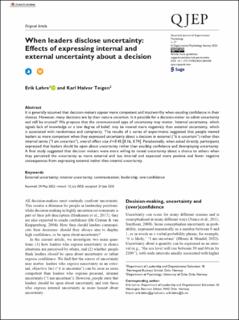When leaders disclose uncertainty: Effects of expressing internal and external uncertainty about a decision
Journal article, Peer reviewed
Published version
Permanent lenke
https://hdl.handle.net/11250/3108053Utgivelsesdato
2023Metadata
Vis full innførselSamlinger
Originalversjon
10.1177/17470218231204350Sammendrag
It is generally assumed that decision-makers appear more competent and trustworthy when exuding confidence in their choices. However, many decisions are by their nature uncertain. Is it possible for a decision-maker to admit uncertainty and still be trusted? We propose that the communicated type of uncertainty may matter. Internal uncertainty, which signals lack of knowledge or a low degree of belief, may be viewed more negatively than external uncertainty, which is associated with randomness and complexity. The results of a series of experiments suggested that people viewed leaders as more competent when they expressed uncertainty about a decision in external (“It is uncertain”) rather than internal terms (“I am uncertain”), overall effect size d = 0.45 [0.16, 0.74]. Paradoxically, when asked directly, participants expressed that leaders should be open about uncertainty rather than exuding confidence and downplaying uncertainty. A final study suggested that decision makers were more willing to reveal uncertainty about a choice to others when they perceived the uncertainty as more external and less internal and expected more positive and fewer negative consequences from expressing external rather than internal uncertainty.

